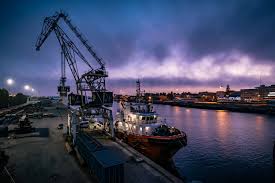
Top Trends Shaping the Future of Logistics Services in India
India's logistics sector is undergoing a significant transformation, driven by rapid economic growth, technological advancements, and evolving consumer demands. As the backbone of trade and commerce, the logistics industry plays a crucial role in ensuring the seamless movement of goods across the country. Here are the top trends shaping the future of logistics services in India:
1. Digital Transformation and Technology Integration
a. Internet of Things (IoT)
IoT is revolutionizing logistics by enabling real-time tracking of goods and vehicles. Sensors embedded in trucks, containers, and warehouses provide critical data on location, temperature, humidity, and more. This data helps companies optimize routes, reduce transit times, and ensure the safe handling of perishable goods.
b. Artificial Intelligence (AI) and Machine Learning (ML)
AI and ML are being leveraged to predict demand, optimize inventory management, and enhance route planning. Predictive analytics can forecast potential disruptions and suggest alternative routes, ensuring timely deliveries. Additionally, AI-driven chatbots are improving customer service by providing real-time assistance and updates.
c. Blockchain Technology
Blockchain offers a transparent and secure way to manage supply chains. It ensures data integrity and traceability, reducing fraud and errors. Smart contracts on blockchain can automate and streamline processes, from order placement to delivery and payment.
2. E-commerce Boom
The rise of e-commerce has significantly impacted logistics in India. Online shopping demands faster and more efficient delivery services. To meet these expectations, logistics companies are adopting various strategies:
a. Last-Mile Delivery Solutions
Companies are focusing on optimizing last-mile delivery, which is the final step in the logistics process. Innovations like drone deliveries, autonomous vehicles, and crowd-sourced delivery models are being explored to reduce costs and improve delivery times.
b. Warehousing and Fulfillment Centers
To support the e-commerce surge, there is a growing need for strategically located warehousing and fulfillment centers. Modern warehouses equipped with advanced technologies such as robotics and automated sorting systems are becoming the norm.
3. Sustainable and Green Logistics
As environmental concerns grow, the logistics industry is under pressure to adopt sustainable practices. Companies are exploring eco-friendly solutions to reduce their carbon footprint:
a. Electric Vehicles (EVs)
The adoption of electric vehicles for transportation is gaining momentum. EVs offer a greener alternative to traditional diesel-powered trucks, reducing emissions and operational costs.
b. Alternative Fuels
Biofuels, hydrogen fuel cells, and compressed natural gas (CNG) are being explored as sustainable alternatives to conventional fuels. These options help in reducing the environmental impact of logistics operations.
c. Green Warehousing
Green warehousing practices, such as using renewable energy sources, energy-efficient lighting, and sustainable building materials, are being implemented to minimize environmental impact.
4. Government Initiatives and Policy Reforms
The Indian government is playing a pivotal role in transforming the logistics sector through various initiatives and policy reforms:
a. Goods and Services Tax (GST)
The implementation of GST has streamlined interstate logistics by eliminating multiple state-level taxes. This has resulted in faster movement of goods and reduced logistics costs.
b. Infrastructure Development
Massive investments are being made in infrastructure development, including the construction of highways, ports, and dedicated freight corridors. These projects aim to improve connectivity and reduce transit times.
c. National Logistics Policy
The National Logistics Policy focuses on reducing logistics costs, improving efficiency, and promoting the use of technology. It aims to position India as a global logistics hub.
5. Startups and Innovation
The logistics sector in India is witnessing a surge in startup activity, driven by innovation and technology:
a. Logistics Aggregators
Startups are acting as aggregators, connecting shippers with transporters through digital platforms. This model increases efficiency, reduces costs, and provides better visibility into the supply chain.
b. Hyperlocal Delivery
Hyperlocal delivery startups are catering to the growing demand for instant deliveries, particularly in urban areas. They use advanced algorithms and extensive delivery networks to ensure quick and reliable service.
c. Supply Chain Financing
Fintech startups are offering supply chain financing solutions, enabling small and medium-sized enterprises (SMEs) to access working capital. This helps in improving cash flow and operational efficiency.
6. Changing Consumer Expectations
Consumers today demand faster, more reliable, and flexible delivery options. Logistics companies are adapting to these changing expectations:
a. Same-Day and Next-Day Delivery
To meet consumer demand for quick deliveries, companies are investing in infrastructure and technology to offer same-day and next-day delivery services.
b. Flexible Delivery Options
Customers prefer flexible delivery options, such as delivery time slots and alternative delivery locations. Logistics companies are providing these options to enhance customer satisfaction.
c. Reverse Logistics
With the increase in online shopping, the management of returns and reverse logistics has become crucial. Efficient reverse logistics processes ensure customer satisfaction and reduce operational costs.
Conclusion
The future of logistics services in India is being shaped by a combination of technological advancements, government initiatives, and changing consumer expectations. Companies that embrace these trends and invest in innovation will be well-positioned to thrive in this dynamic and evolving landscape. By focusing on sustainability, efficiency, and customer-centric solutions, the Indian logistics sector is set to become a global powerhouse, driving economic growth and development.